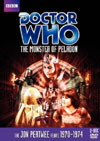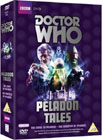DVD Extras include:
Silence in the CitadelA bizarre coding error in many satellite receivers in our area, and the fact that our satellite dealer was away for a two week hunting season, meant that for many years the only copies I had of this story and "Planet of the Spiders" (the next story) came to me completely silent. To keep myself interested in viewing the visuals, I dubbed all kinds of music onto that silence, whatever I could think of that had something to do with the mood of the scenes or sequences at hand. "Monster of Peladon" had a royal court nature earning it a lot of classical music, while "Planet of the Spiders" leant more towards instrumental pop songs of the 60's and 70's, especially those following the James Bond action spy trend. Subsequently hearing Dudley Simpson's scores, they do fall quite a fair bit short of my vivid auditory imagination.Again, I do question Simpson's choice to attempt to compose "new" music for every scene, instead of taking an approach of composing less, but in a thematic style, and reusing it across a wider range of stories. His actual music ends up sounding like it's stumbling randomly over the same territory again and again, without any really solid thematic material to help tie the emotional threads of the story together. Extra attentive listening reveals an attempt at a unique Peladonian anthem during early court scenes, and the percussion motif for the Ice Warriors from "The Curse of Peladon" (story no. 61), which sounds quite like one of Jerry Goldsmith's for Star Treks five and eight, makes a slightly modified return in this story, now embellished with a particularly excellent "ice-wind" instrument effect. Why is the impact of these wonderful bits so diminished? The answer seems to lie in the brass section, which is overused in most of Simpson's scores as it tries to follow every minutia of suspense, surprise, and disappointment in the visual drama with perfect synchronization, usually doing little for the emotional subtext of a story. One becomes too accustomed to the constant presence of this ambling brass and tunes the music out. The brass accompaniment during the Peladon Anthem in particular seems to be playing a three note motif that appears monotonously typical of most of Simpson's scores. Meanwhile the unique instrumentation of the new Ice Warrior stuff seems far too subdued in the final mix. A pity. There is some good composition here after all, but one has to dig to find it.
Plot ScrutinyThe main characters of this story generally get good entrances, with the etiquette of the royal court demanding a few proper introductions on top of a good exposition of tensions between the miners and the pro-technology hierarchy ruling Peladon. The Doctor and Sarah also make a suitable entrance with the TARDIS. Although the interior is not shown, it isn't terribly necessary today. Hayles quickly and expertly uses the typical mistrust by the locals to impart through dialogue everything one needs to know about our hero and his previous relationship to the planet. Before the episode is finished, the Doctor is investigating the heart of the sci-fi mystery plaguing the Peladonians, namely the supernatural and deadly manifestations of the beast Aggedor.Episode two's plot direction appears rather contrived, although I'll save that discussion and its spoilers for the in-depth analysis version of this review, along with the comparisons between Queen Thalira and her father. Come back and read them after you've seen the story. The script keeps the cliffhangers in this story fresh and interesting, although they seem to lack a certain power in their execution, and one of them in particular is a real let-down.
"The Monster of Peladon" eventually endures a bit of an anti-climax. It draws easy comparison with the ending from "Curse of Peladon", only this time the performances and the acting don't gel so well, and the drama isn't nearly as satisfying. The goodbye scenes work well enough to end the story on a high note.
Casting HighlightsI like Rex Robinson a lot in this one; I think it's my favourite of his Doctor Who performances. Donald Gee manages to remind me of Tom Baker a lot in his mannerisms. Nina Thomas can be very expressive and subtle, managing to make the Queen compelling and watchable even though the character is such a weenie on paper. Jon Pertwee and Elisabeth Sladen put in their usual exemplary work. Stuart Fell deserves mention for giving Alpha Centauri some very emotional gestures under difficult circumstances.
A short list of Brian Hayles Stories, ranked from best to worst:
-The Curse of Peladon
-The Monster of Peladon
-The Ice Warriors (story no. 39)
-The Smugglers (story no. 28)
-The Seeds of Death (story no. 48)
("The Celestial Toymaker" (story no. 24) that ended up in Doctor Who
is too much of a Gerry Davis work to be included. I would need to see
the original Brian Hayles/Donald Tosh version of the script to rank it here.)
This story has become available on DVD and VHS video. Click on the Amazon symbol for the location nearest you for pricing and availability:
Comments on this article are welcome. You may contact the author from this page:
|








